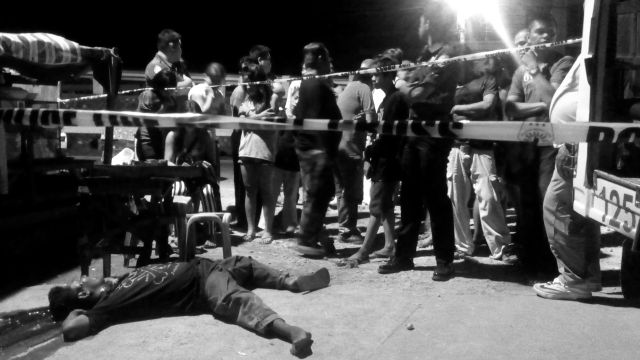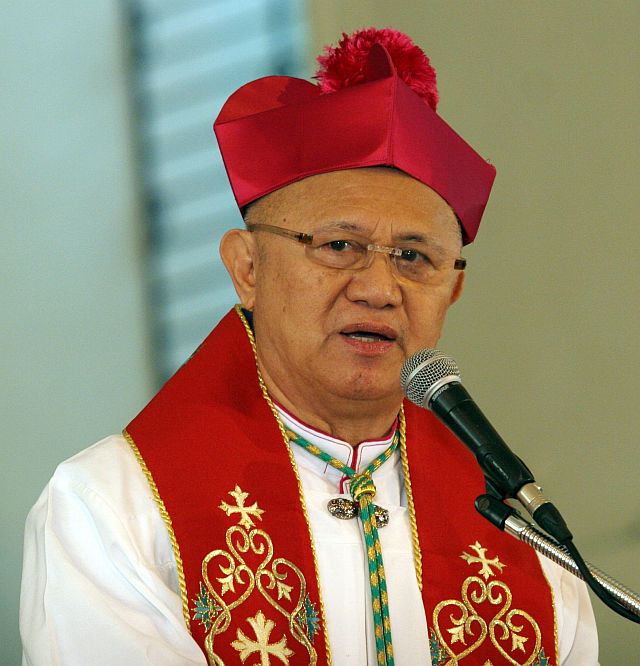
Sergio Pepito Dean, 42, a cigarette vendor and a polio victim with just one eye, lies dead on the pavement in Tabok, Mandaue City after he was gunned down by two motorcycle-riding men at dawn of Thursday. (CDN PHOTO/TONEE DESPOJO)
CONCLUSION
Leaders of the Catholic Church, an institution that helped oust two of the country’s leaders in the past, have varied responses to the Duterte administration’s campaign against illegal drugs.
While all of them agree that killing is a grave sin clearly stated in one of God’s Ten Commandments, bishops vary on how to approach the issue on the rising body count of drug suspects who have ended up dead in brutal murders that have become common fodder for news.
Some were uncertain on how to take a stand against the spate of killings in a war that has spawned overwhelming popular support.
After months of keeping his silence, Cebu Archbishop Jose Palma now felt that he needed to speak and denounce the killings.
Setting aside fears that his position may catch the ire of President Rodrigo Duterte’s supporters, the 66-year-old prelate, in an interview, expressed concern over the rising death toll from the administration’s war against prohibited drugs.
“We begin to be concerned and afraid knowing that so many (people) have died. The numbers are increasing and it is not a good sign. This is a serious concern for our country,” he said.
Palma stressed that killing suspected criminals was not the right antidote to the country’s problem on illegal drugs and crime.
“While we support the campaign against drugs, it should be done within the ambit of the law. We feel that anything extrajudicial is not the best way to answer our problems,” he added.
He also opposed plans to revive the death penalty for high-level drug traffickers, saying that the sanctity of life must be preserved at all times and in whatever circumstances.
“The question on death penalty has always been debated. Some debate for it, while others debate against it. But on the part of the Church, we call on government to address crimes through other means instead of killing criminals,” the prelate explained.
In a visit to the Police Regional Office in Central Visayas (PRO-7) early December, Senator Vicente Sotto III announced plans to bring back the death penalty for “high-level drug traffickers.”
In 2014, Sotto sought the revival of the death penalty law through lethal injection when he authored Senate Bill No. 2080, which proposed to repeal Republic Act No. 9346, the law which prohibits the imposition of death penalty in the Philippines.
Sotto said there was a need to revive the death penalty for high-level drug traffickers to frighten big time drug dealers and to prevent them from operating in the country.
The senator expected human rights groups and the Catholic Church to oppose the plan but expressed hope that if the death penalty were to be imposed on high-level drug traffickers only, there is a chance for his revival efforts to succeed.
But the Catholic Church has consistently aired opposition against the death penalty and extrajudicial killings, regardless of who gets to be punished.
Palma said that the best thing for the Church to do for now is to seek divine intervention to end the culture of death that pervades the country today.
“We pray to the Lord that there will be a way to stop extrajudicial killings. We are after justice but not in a manner that is not the best answer to the problem,” he said.
In the coming days, Palma said the Archdiocese of Cebu will hold rallies to denounce extrajudicial killings and the government’s plan to revive the death penalty.
A “serious study and prayerful attitude” must be done to find out the best way to address the issues, said Palma.
“As part of the teachings in the Church, we say it is not enough for anybody to take justice into their hands,” said Palma, the former president of the Catholic Bishops’ Conference of the Philippines.

PALMA
Msgr. Joseph Tan, spokesperson of the archdiocese, explained that the local church, including Cebu Archbishop Jose Palma, urged civil society and independent commissions to conduct an investigation into the series of killings to ferret out the truth.
“We want to know the truth behind all these killings,” Tan said.
In general, the monsignor said the Catholic Church condemns all kinds of killings because it goes against teachings that only God, the author of life, has the right to strip a person of this gift.
“Killing in whatever manner is wrong in the same way that suicide, euthanasia, and abortion are wrong. Death, other than natural causes, is immoral,” Tan said.
For his part, human rights lawyer Democrito Barcenas said killing drug suspects is never an antidote to the problem on illegal drugs.
“The rule of law must take its course. Even if a person committed an offense, he or she should not be killed. They should be given a second chance, and let the courts decide on their fate,” Barcenas said in an interview.
“In the first place, drug users and pushers are not criminals but victims. They are products of broken homes, poverty, poor education, and product of circumstances,” said Barcenas, believing that Duterte will not be able to address the problem on illegal drugs.
“Not in a lifetime. This is a worldwide problem. Our country has a lot of problems and yet Duterte puts so much emphasis on drugs,” he said.
Alarmed by the spate of killings in Cebu, Barcenas proposed the creation of a multisectoral alliance that will fight supposed vigilantes on two fronts: legally and through public opinion.
“While we are one in the fight against drugs, we are concerned with the growing culture of vigilantism and violence. We hope the war is not done at the expense of the innocent and the defenseless,” he said.
Barcenas, chairman of the Free Legal Assistance Group in Central Visayas (Flag-7), called on the Church, members of the academe, the Integrated Bar of the Philippines (IBP), the Commission on Human Rights (CHR), and others to join hands in fighting extrajudicial killings.
“We’re not against the campaign to eliminate illegal drugs. In fact, we support that. However, due process and the rule of law must be observed,” he said.
Moreover, Barcenas said cops who kill suspected drug personalities in alleged shootouts should be investigated,
“President Rodrigo Duterte announced to eliminate illegal drugs in three to six months. The problem is it seems that our policemen are now pressured to deliver the promise,” he said.
“And I would like to remind the government that the sixth commandment has not been amended. It’s still ‘Thou shall not kill.’ It doesn’t say, ‘Thou shall not kill unless the victim is a drug pusher.’ Extrajudicial killings are unChristian. It is against the Bible and the law of men,” he added.
Asked whom he believed was behind the summary executions, the veteran lawyer wryly said, “Who else will do it? The Catholic Church or the IBP? I don’t think so.”
Disclaimer: The comments uploaded on this site do not necessarily represent or reflect the views of management and owner of Cebudailynews. We reserve the right to exclude comments that we deem to be inconsistent with our editorial standards.
